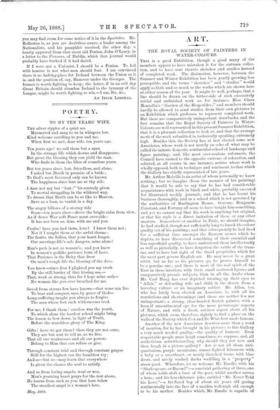POETRY.
TO MY TEN YEARS' WIFE.
THE silver ripples of a quiet sea Murmured and sang to us in whispers low, Kind welcome carolling to you and me, When first we met, dear wife, ten years ago.
Ten years ago ! we call them but a span In the strange life which dawns and disappears ; But great the blessing they can yield the man, Who finds in them the bliss of countless years.
But ten years since, lost, friendless, and alone, I asked but Death in promise of a bride ; To God's most favoured only can be known The happiness since lent me at thy side.
I dare not say but " lent :" 'tis scarcely given To mortal struggling in the wildered way, To dream that Earth can be so like to Heaven, Save as a loan, to vanish in a day.
The angry billows of a stormy tide Soon—ten years since—drove the bright calm from view, As if fierce War soft Peace must over-ride : It has not been so, dear, with me and you.
Faults! have you had them, love ? I know them not ; Not if I sought them at the awful throne : The faults, the follies, that your heart forgot, Our marriage-life's sole dangers, mine alone!
Man's path is not as woman's ; and you knew In woman's godlike patience born of Love, That Patience is the Deity that drew On man's rough life the blessing of the dove.
•
You knew—since first I plighted you my troth
By the still border of that kissing sea,— That, weak or strong, thus far I kept mine oath—
No woman like you ever breathed for me.
Saved from storms few have known—that none can live To bear and conquer, save by grace of God— Long-suffering taught you always to forgive The man whose feet such wildernesses trod.
For me, I thank them ! careless was the youth, To which alone the hardest school might bring The lesson to bow down, in light of Truth, Before the matchless glory of The King.
Gifts ! have we got them? then they are not ours ; They are but sent to tell us, as we live, That all our weaknesses and all our powers Belong to Him that can refuse or give.
Through constant trial and through constant prayer Still for the highest can the humblest try ; And so—but so—may learn that everywhere Is given the chance the soul to satisfy.
And as from loving angels, weal or woe, Man's yearning heart prays for the rest above, He learns from such as you, that here below The steadiest angel is a woman's love.
May, 1888.


































 Previous page
Previous page